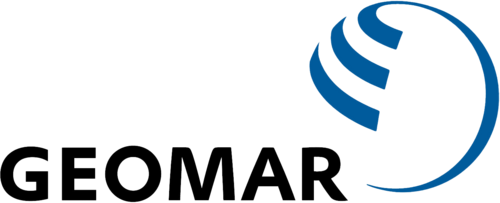Im Ozean Zuhause: Das GEOMAR bietet eine dynamische Forschungsumgebung für eine interdisziplinäre und innovative Ozeanforschung.
HIDA bringt Data-Science-Talente und Meeresforschung zusammen: Am GEOMAR können sie in zukunftsweisenden Projekten dazu beitragen, die komplexen Prozesse im Meer besser zu verstehen.
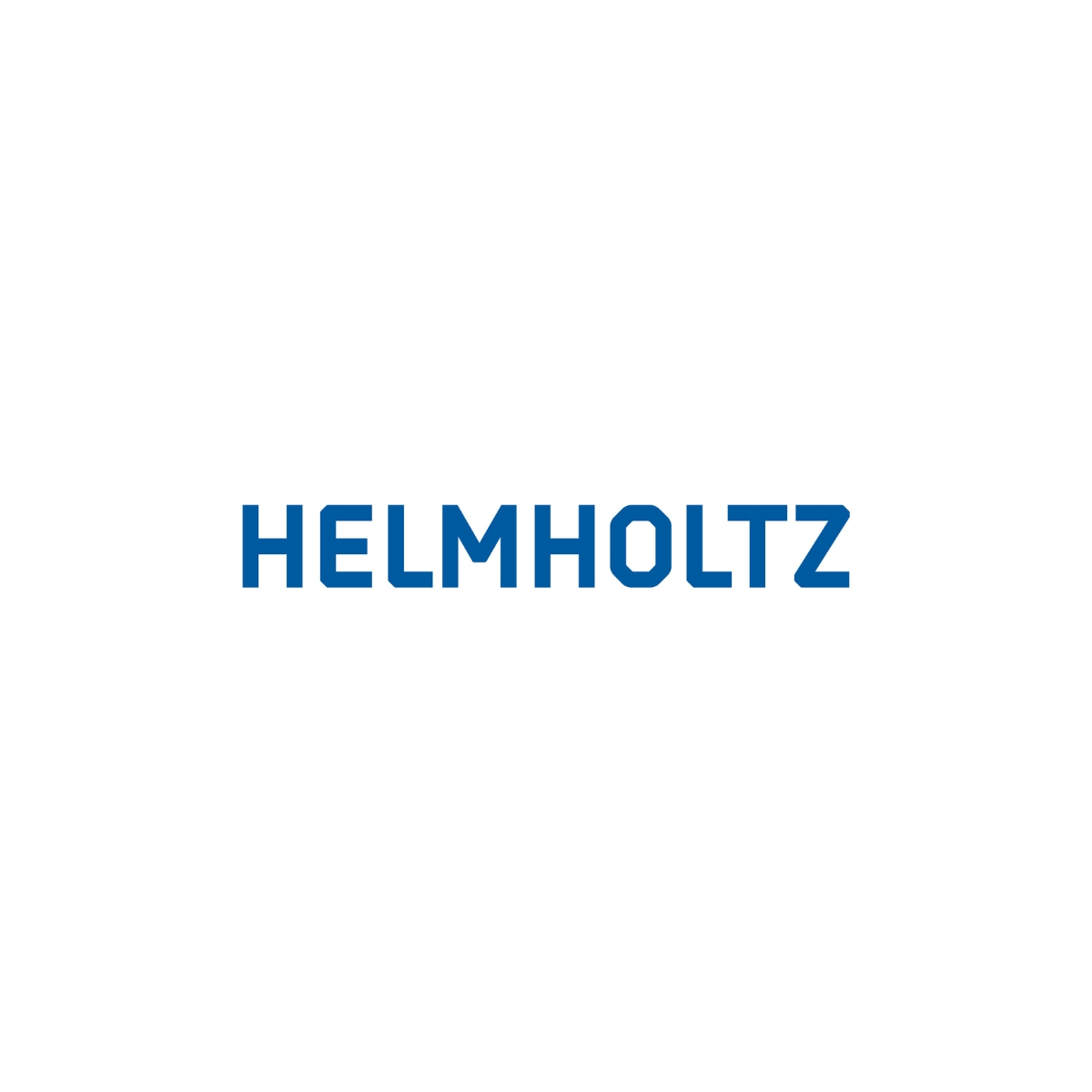
Über die Helmholtz-Gemeinschaft
Die Helmholtz-Gemeinschaft
Die Helmholtz-Gemeinschaft ist die größte Wissenschaftsorganisation Deutschlands. Unsere übergreifenden Forschungsprogramme verbinden die 18 Helmholtz-Zentren miteinander.
Jedes Zentrum verfügt über eigene wissenschaftliche Schwerpunkte und Infrastrukturen. Die Forschung ist thematisch in sechs strategische Bereiche gegliedert.
- Energie
- Erde und Umwelt
- Gesundheit
- Information
- Luftfahrt, Raumfahrt & Verkehr
- Materie
Das GEOMAR Helmholtz-Zentrum für Ozeanforschung Kiel zählt zu den weltweit führenden Instituten der Meeresforschung. Die Wissenschaftler analysieren die chemischen, physikalischen, biologischen und geologischen Prozesse im Ozean sowie deren Wechselwirkungen mit Meeresboden und Atmosphäre. Dafür steht eine hochmoderne Forschungsinfrastruktur zur Verfügung, darunter spezialisierte Forschungsschiffe, Tauchboote, Segeldrohnen und Unterwasserroboter.
Die Forschung am GEOMAR deckt das gesamte Spektrum der Meereswissenschaften ab – von der Untersuchung mariner Ökosysteme und der Auswirkungen des Klimawandels bis hin zu praxisnahen Fragestellungen wie nachhaltigen Fischereikonzepten oder Methoden zur Entfernung von Umweltverschmutzungen. Ziel ist es, die komplexen Prozesse im Meer besser zu verstehen, ihren Einfluss auf das globale Klima zu analysieren und nachhaltige Lösungen für den Schutz der Ozeane zu entwickeln.
Forschungsschwerpunkte:
- Ozeanzirkulation und Klimadynamik
- Marine Biogeochemie
- Marine Ökologie
- Dynamik des Ozeanbodens
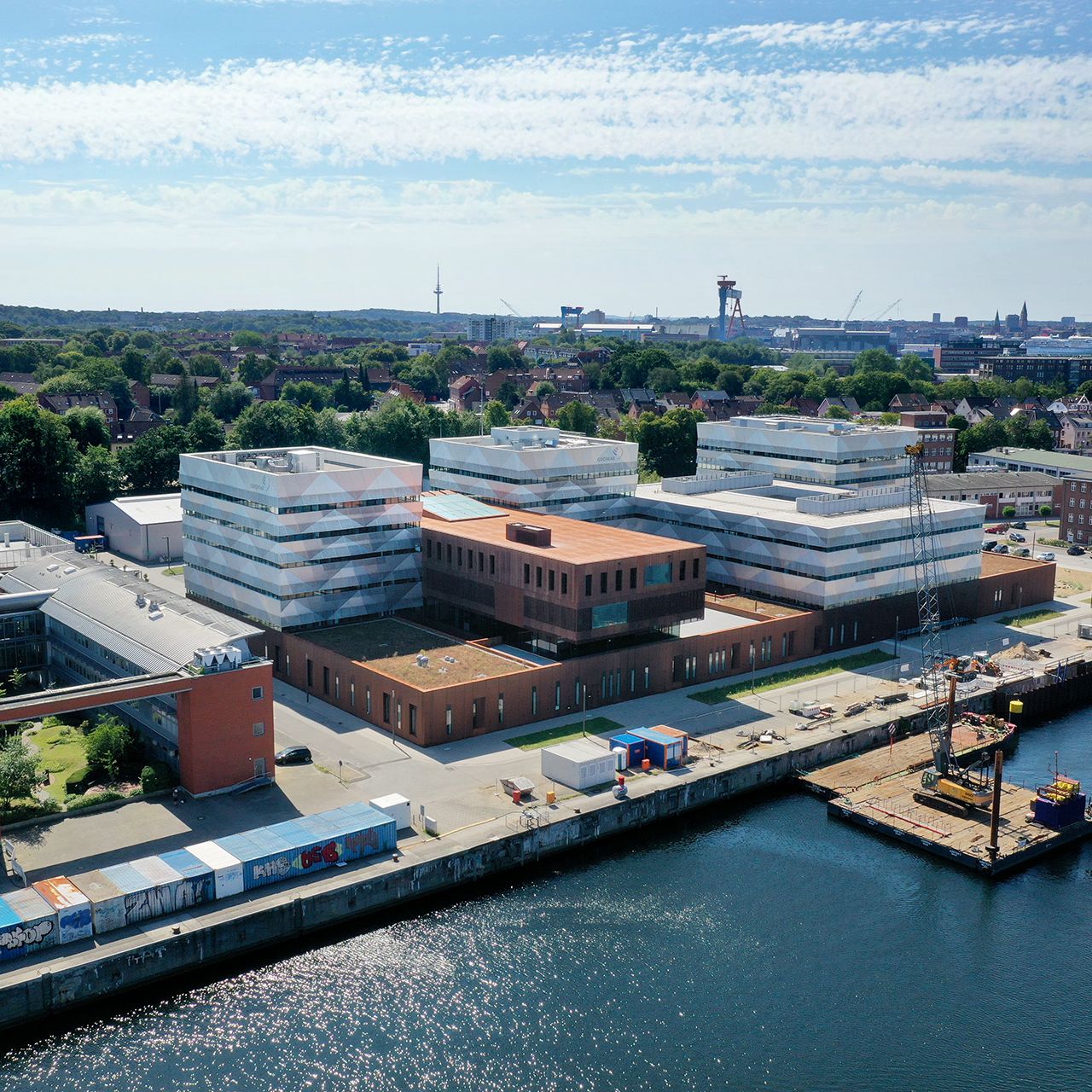
Die Standorte
Die Standorte
Seit September 2023 sind alle Bereiche und Einheiten des GEOMAR in einem modernen Neubau am Seefischmarkt in Kiel vereint – und bilden damit einen einzigartigen meereswissenschaftlichen Campus.
Darüber hinaus verfügt das GEOMAR über zwei eigene Forschungsschiffe sowie über hochmoderne Unterwasserroboter für die Tiefseeforschung.
Das Ocean Science Centre Mindelo (OSCM) ist eine gemeinsame Einrichtung des GEOMAR Helmholtz-Zentrums für Ozeanforschung Kiel und des Instituto do Mar (IMar) in Mindelo, Kap Verde. Das Zentrum wurde 2017 eröffnet und dient seither der internationalen wissenschaftlichen Gemeinschaft als multifunktionale Basis für Langzeitbeobachtungen und Feldforschung im tropischen Nordostatlantik.
Kompetenzen des GEOMAR im Bereich Data Science & KI
Das GEOMAR nutzt modernste KI-Technologien und datengetriebene Methoden zur Analyse ozeanografischer, klimatischer und biologischer Prozesse. Interdisziplinäre Teams arbeiten zusammen, um innovative Modelle und Algorithmen für ein besseres Verständnis mariner Systeme zu entwickeln.
Durch den Einsatz leistungsfähiger KI-Modelle und Big-Data-Analysen werden komplexe Umweltveränderungen frühzeitig erkannt und präzisere Vorhersagen zu Klima- und Meeresprozessen ermöglicht.
- KI-gestützte Analyse von Satelliten- und ozeanografischen Daten
- Automatisierte Mustererkennung für marine Ökosysteme
- Maschinelles Lernen zur Verbesserung von Klimamodellen
- Entwicklung von Simulationsmodellen für Meeresströmungen und Küstendynamik
- Multimodale Datenintegration zur besseren Einschätzung von Umweltveränderungen
Mehr als 1.000 Mitarbeitende aus mehr als 50 Ländern arbeiten am GEOMAR.
Bewerbung
Sie möchten am GEOMAR forschen und arbeiten? Dann bewerben Sie sich jetzt für das HIDA Mobility Program!
Kontaktieren Sie Ihren potenziellen Betreuer oder Ihre potenzielle Betreuerin bitte vorab per E-Mail, um ein Forschungsprojekt vorzuschlagen und zu besprechen. Reichen Sie erst nach dieser Klärung Ihre Bewerbung ein.
Weitere Informationen zu den Bewerbungsregularien finden Sie hier!
Hinweis für externe Bewerber:
Bei Fragen zu Bewerbungsformalitäten und organisatorischen Abläufen wenden Sie sich bitte direkt an Ihr Heimatinstitut.
Die Hosts am GEOMAR
Lernen Sie hier einige potentielle Gastgeberinnen und Gastgeber am GEOMAR kennen und erfahren sie mehr über deren jeweilige Data Science-Forschung.
Bitte beachten Sie: Die hier aufgeführte Liste zeigt lediglich eine Auswahl möglicher Gastgeber.
Darüber hinaus können Sie auch eigenständig potenzielle Hosts im Zentrum kontaktieren und mit ihnen eine Teilnahme am HIDA Mobility Program vereinbaren.
Wenn Sie Fragen haben, senden Sie bitte eine E-Mail an: hida@helmholtz.de
Sie möchten selbst gerne Helmholtz-Gastgeber werden und suchen nach Unterstützung für Ihr Forschungsprojekt? Dann wenden Sie sich ebenfalls an die oben genannte E-Mail Adresse.
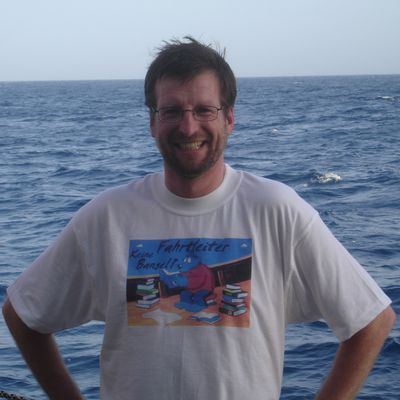
Hermann Bange
Trace Gas Biogeochemistry
Ansprechpartner

Short summary of your group's research: My working group is working on the biogeochemical pathways and emissions of climate -relevant trace gases such as N2O, CH4, CO, DMS and NO. Moreover, we run the Boknis Eck Time-Series Station (Eckernförde Bay, SW Baltic Sea) and the MEMENTO (the MarinE MethanE and Nitrous Oxide) database. We are operating worldwide.
What infrastructure, programs and tools are used in your group? - Boknis Eck Time-Series Station (www.bokniseck.de); Boknis Eck underwater observatory
- MEMENTO database (ttps://memento.geomar.de)
- Various research vessels
- Lab based measuerments
What could a participant of the HIDA Trainee Network learn in your group? How could he or she support you in your group? We offer:
- Work with time series data and databases (Boknis Eck, MEMENTO)
To want:
- Someone who to develop and realise new concepts for visualisation/integration/analysis of data sets.
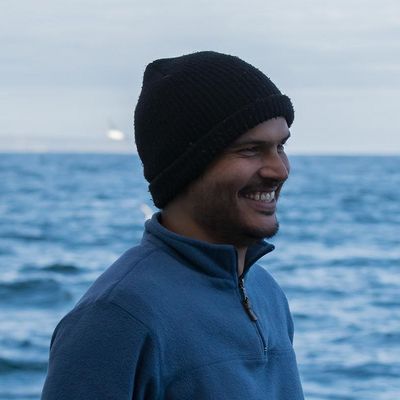
Amir Haroon
Marine Geodynamics
Ansprechpartner

Short summary of your group's research: We apply numerous geophysical methods to understand sub-seafloor processes for tectonic, environmental and resource questions. Our expertise involves not only the evaluation of the individual methods / datasets, but has recently evolved into the application of state-of-the-art machine learning workflows to integrate disparate geophysical and geological data on various spatial scales.
What infrastructure, programs and tools are used in your group?
HPC Computing Centres at CAU Kiel
Open-source programms for interpreting Electromagnetic data
Python tools for ML
What could a participant of the HIDA Trainee Network learn in your group? How could he or she support you in your group? We are seeking for guest researchers with various geophysical data (e.g. CSEM, Seismics and Borehole Data) seeking to develop new concepts on integrating these into a consistent subsurface model.
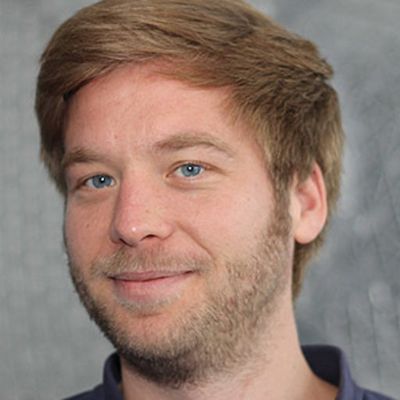
David Nakath
Marine Geosystems
Ansprechpartner

Short summary of your group's research: The Oceanic Machine Vision Group at the GEOMAR works on the topic of optical underwater surveys employing artificial intelligence (AI) and classical computer vision approaches. To this end, we seek to enable cameras to serve as faithful measurement instruments and navigation sensors in the deep sea. The latter, visually challenging environment, presents us with a lot of geometric (refraction) and radiometric problems (attenuation, scattering) which we seek to solve.
What infrastructure, programs and tools are used in your group? We normally devise novel approaches writing Python / C++ Code on Linux machines storing it on GIT, potentially in some remote (over ssh) work. If desired, access to GPUs can be provided in addition.
The subsequent evaluation is often conducted on synthetic as well as real data. To this end, we maintain multiple sets of underwater imagery, specifically tailored to the problems we work on. We also have camera-light systems, which can be operated manually, inside a test tank or directly in the Baltic Sea. In addition, they can be attached to AUVs and the like, to capture actual deep sea datasets. Hence, new data can be taken, if necessary.
What could a participant of the HIDA Trainee Network learn in your group? How could he or she support you in your group? The guest can learn about synthesizing visual data or taking real data in controlled conditions in a test tank, or at the actual sea. Furthermore, we can provide deep insights about geometric and radiometric problems typically encountered in underwater scenarios. We have a wide range of topics inter alia covering refraction, color correction, medium estimation, light pose optimization, structure from motion, state estimation and image segmentation/classification. We will approach those problems with the means of classical computer vision but also with neural networks in conjunction with differentiable physical models. Finally, we would be happy if the guest researcher would co-author a research paper and/or contribute to our software.
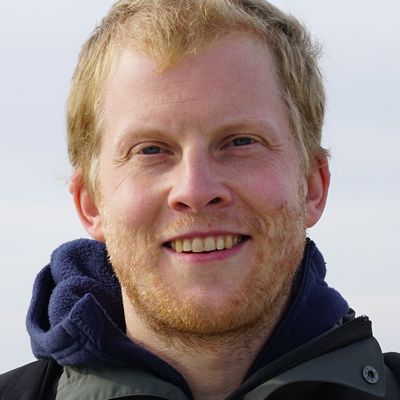
Timm Schoening
Data Science Unit
Ansprechpartner

Three-sentence summary of your group's research: The Data Science Unit (DSU) of GEOMAR develops Data Science methods for marine research and applies them together with the researchers to the heterogeneous data of GEOMAR and its partner institutes. The DSU offers support and training on Data Science methods to researchers at GEOMAR. We aim to adress the grand challenges of marine science with data science methods.
What infrastructure, programs and tools are used in your group? We work with all data types relevant to the marine sciences: time series (e.g. in climate research, ecology), grids (e.g. in seafloor mapping, microscopy imagery), cubes (e.g. in ocean current simulation, 4D visualization). Our data products are developed and operated interactively (e.g. Jupyter notebooks) and most of the magic happens in Python. High-performance computing can be conducted on HGF computing ressources, at our compute cluster at Kiel University or on mobile GPU clusters for HPC computing at sea.
What could a guest researcher learn in your group? How could he or she support you in your group? Working with marine science data sets. Detecting and classifiying events in heterogeneous data (time series, grids, data cubes, ...). AI and ML methods. Supervised / unsupervised clustering of data. Integration of AI, simulation, and observation methods and data into Digital Twin frameworks. Working towards solutions for pressing ocean and society challenges.
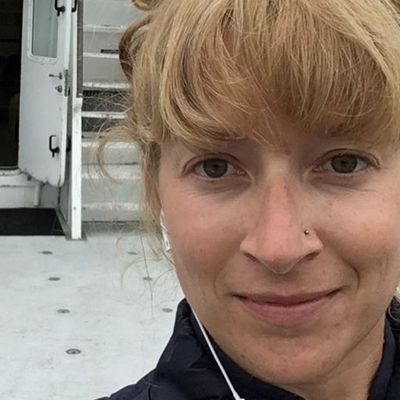
Kristin Bergauer
Microbial Oceanography & Biogeochemistry
Ansprechpartner

Three-sentence summary of your group's research: Our laboratory conducts research on single-celled organisms known as bacteria and archaea that have a crucial role in the cycling of (micro)nutrients in both the photic and aphotic regions of the global oceans. Our research in the field of biological oceanography encompasses the integration of marine microbial ecology and biogeochemistry, operating under the overarching framework of physical oceanography. At GEOMAR, our research focuses on investigating microbial B vitamins, ectoenzymes, and the functional capabilities of microorganisms. We employ integrated multi-omics approaches, together with laboratory studies conducted at the Boknis Eck Time-Series Station in the Southwest Baltic Sea and during oceanographic cruises.
What infrastructure, programs and tools are used in your group? State-of-the-art molecular tools are employed in our lab facilities to conduct experiments involving these organisms. These tools include e-DNA analysis, molecular laboratory techniques, flow cytometry, microscopy, and the use of genetically modified organisms (GMOs). Metagenomic, -transcriptomic, and -proteomic analyses generate a vast amount of data, which can be effectively analyzed by leveraging the high-performance computing cluster available at Kiel University. The analysis of Underwater Vision Profiler (UVP) images is presently conducted using the Quantitative Imagery Platform of Villefranche.
What could a guest researcher learn in your group? How could he or she support you in your group? The visiting scientist will have the opportunity to actively participate in ongoing research and gain knowledge regarding the bioinformatic analysis of multi-omic and e-DNA datasets. In summary, this encompasses the implementation of essential software, the development of procedural frameworks, computational methodologies for data-driven microbiology, and the utilization of visualization techniques.


